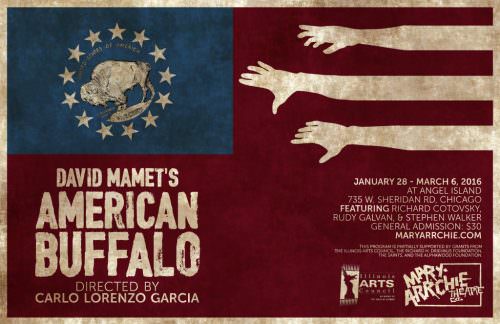American Buffalo
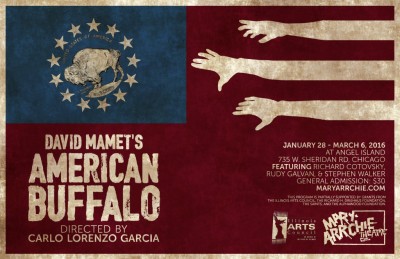 By David Mamet
By David Mamet
Directed by Carlo Lorenzo Garcia
Produced by Mary-Arrchie Theatre Company, Chicago
A Perfect Ending for Mary-Arrchie
Some theatres are seemingly immortal, but they all have to end at some point. Several long-running companies have dissolved recently in Chicago or are in the process of mounting their last production, and they’ve gone with varying degrees of dignity. Mary-Arrchie, I’m glad to say, closes with an excellent production of David Mamet’s American Buffalo, a play which is appropriate for a number of reasons. The 1975 drama is historically symbolic of the rise of Chicago’s storefront and upstairs theatres, such as Mary-Arrchie’s slated-for-demolition Angel Island space. Its gritty, unsentimental, darkly humorous depiction of life’s losers fits well with the aesthetic Mamet’s emulators popularized, and which became associated with Chicago plays in the latter part of the last century. It also contains three juicy roles, including one perfectly suited for Mary-Arrchie’s co-founder, artistic director, and company member for thirty years, Richard Cotovsky.
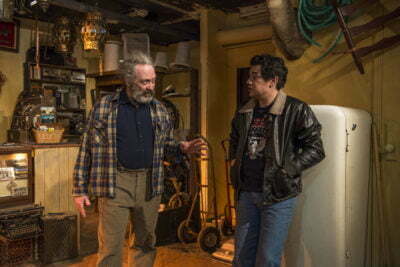
John Holt’s scenic design is a surprisingly well-organized junk shop. The deer trophies, cameras, power cables, lanterns, and other bric-a-brac are sorted on shelves surrounding the observant, but laid-back proprietor, Don Dubrow (Cotovsky). Don has taken on a teenage gopher, Bob (Rudy Galvan), whose dim-witted geniality is more use to propping up Don’s desire to mentor someone than help running the store. Bob’s also not very good at his current assignment, which is to tail a man who lives nearby. Bob has just returned to inform Don that he thinks the man went out, but isn’t sure, because he didn’t stay posted at the door like he was supposed to, and obviously, isn’t stationed there now. Don is exasperated, but needles Bob to eat and learn from his mistakes. Less impressed with Bob is Don’s brash, angry friend Teach (Stephen Walker), who lost a significant amount of money gambling the previous night. Looking for a scheme to get in on, he quizzes Don about what they’re up to.
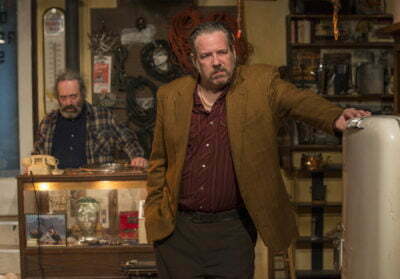
The man Bob is tailing bought a rare buffalo nickel from Don recently. Not sure what it was worth, Don sold it for what he now thinks was too-low a price. But since then he’s found another collector, and plans to break into the first customer’s house to steal back the nickel, and the rest of his coins. Teach likes the idea, but is severely displeased with Bob’s inclusion in it. Not only does it mean having to split the money three ways now that Teach has declared himself to be part of the heist (four counting the middleman to the collector), but Bob is also incredibly stupid. Teach eventually persuades Don to drop Bob, but Don wants to bring in someone else. When that person doesn’t show, and Bob starts behaving suspiciously, it sets off a storm of dangerous paranoia around the junk shop that is conducive to neither business nor friendship.
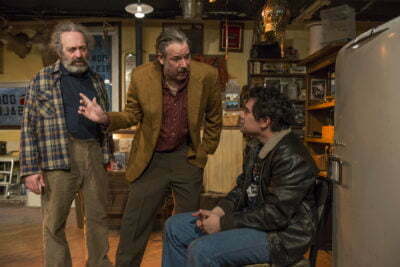
Mamet’s dialogue is notoriously obscure, but director Carlo Lorenzo Garcia and his cast create meanings for every little exclamation and repetition. Don is a criminal, and a seedy one at that, but he takes pride in teaching the junkie Bob how to become independent. That means reminding him to eat yogurt and fruit, in addition to warning him never to confuse work with being friends. Mostly Don stays quiet, but in Cotovsky’s interpretation, he is always alert. As Bob, Galvin is both hilarious and infuriating. He misses the point of nearly everything that is said to him, screws up every job, and the possibility that he is concealing something as if he could possibly pull off a double-cross is insulting. No wonder Teach throws such a famous tantrum. Walker’s role has been played in the past by Mike Nussbaum (who director Greg Mosher described as playing him like “Nathan Leopold in cowboy boots”), Robert Duvall, and Dustin Hoffman, but Walker more than holds his own. Perpetually offended and self-deluded, Teach is frighteningly realistic. While he’s violent and irrational, he’s also the main conduit for Mamet’s eloquence, and his vitriolic descriptions of his female frenemies in the diner, Bob, and everybody else he comes into contact with provide moments of levity as well as wonderment at the author’s bombast.
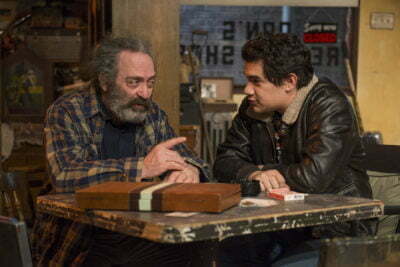
Greg Allen’s adaptation of Ibsen’s Ghosts, which Walker also gave a memorable performance in, bade explicit good-bye to Angel Island. Carlo Lorenzo Garcia’s American Buffalo has a special poignancy because of this being Mary-Arrchie’s last production, but is also a brilliant staging in itself. You don’t have to be familiar enough with the company to feel nostalgic to enjoy the production. But if you do regret not familiarizing yourself with Cotovsky’s crew earlier, The Hypocrites are currently remounting Mary-Arrchie’s wildly popular production of The Glass Menagerie at The Den. New theatres arise all the time, and I expect to see all the artists of Mary-Arrchie continue their work in the future. For now, American Buffalo is as fine a transition as any actors could ask for.
Highly Recommended
Jacob Davis
This show has been Jeff recommended.
Playing at Angel Island, 735 W Sheridan Road, Chicago. Tickets are $30, with discounts for students and seniors. To order, call 773-871-0442. Performances are Thursdays-Saturdays at 8:00 pm and Sundays at 7:00 pm through March 20. Running time is two hours with one intermission.

